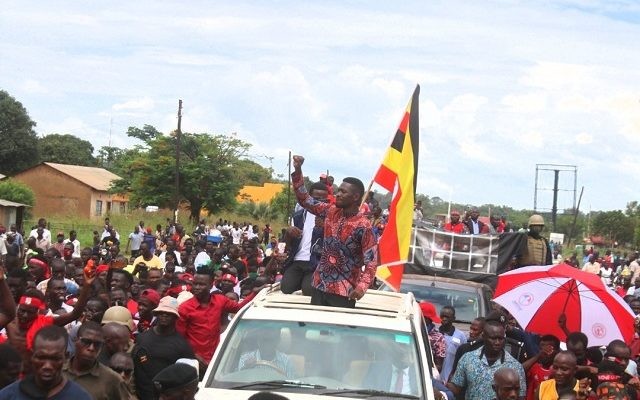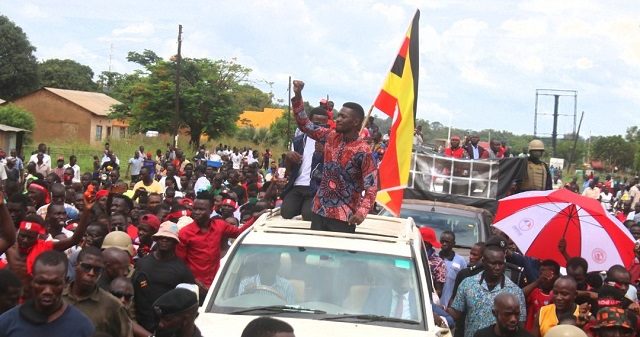While for many people the New Year celebration ends after the first day of the new year, in Uganda, supporters of presidential aspirants hope to extend their celebration beyond the first of January. This is because, on Jan. 14, eligible voters in the East Central Africa country will head for the polls to cast ballots in the country’s presidential elections.
This year’s election is drawing international interest and has become so contentious that a group of religious leaders has stepped in to urge restraint.
While 11 persons were originally cleared to vie for the presidency, close observers narrow the contest to just two candidates: the incumbent Yoweri Museveni, a former guerilla fighter turned politician, and Robert Kyagulanyi, a musician turned politician who also goes by the stage name Bobi Wine.
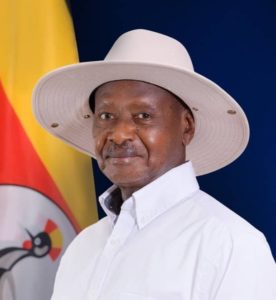
Yoweri Museveni
Museveni, 76, and candidate of the National Resistance Movement, has served as Uganda’s leader since 1986, and his decision to seek re-election has provoked discussions not just in Uganda but Africa generally. Skeptics wonder what more he has to offer his nation. Kyagulanyi, 38, on the other hand, seeks an upset as candidate of the National Unity Platform.
The incumbent and COVID
In his Twitter Christmas message to Ugandans, Museveni, who’s campaigning under the theme “Securing Your Future,” congratulated his countrymen and women for coming this far and urged them to heed instructions that will lead to the defeat of COVID-19. That’s the latest remark from a man who, some critics say, has benefited politically from the virus as his government through its agencies has used the disease as excuse both to restrict political campaigns and clamp down on opponents.
At the receiving end of the crackdown is Kyagulanyi. He has been arrested at least twice in the last two months with some of his supporters. Recently on the campaign trail, Kyagulanyi said he took a long time to arrive at one of his destinations because security agents would not allow him to take the traditional route.
“The police and military do not allow me to talk to the people. You see, in Rushere, they blocked us from accessing the venue and they were beating whoever was coming to listen to us. The same thing happened in Kamenje,” he said. “They don’t want people to come and listen to us. They are scared of people coming together to listen to us.”
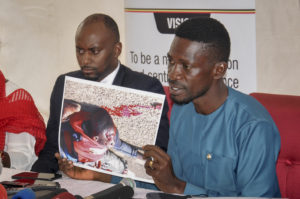
Ugandan opposition presidential candidate Bobi Wine shows a photograph depicting a victim of recent electoral-related violence in the country, at the Electoral Commission in Kampala, Uganda Wednesday, Dec. 2, 2020. Wine said Wednesday after meeting the head of the country’s electoral body that he would resume his campaign after suspending it in protest over police brutality after police shot his car tires and fired rubber bullets that injured his bodyguards and supporters. (AP Photo/Ronald Kabuubi)
In spite of the challenge, Kyagulanyi appears undaunted. “All that matters is for the people to get the message, and we have been telling them that the people will get the message.”
The core of his message is for Ugandans to mobilize to vote out Museveni. It’s been a long road to this time, for an event scheduled at a time the world is battling with COVID-19.
Pandemic restrictions
Ugandans initially wondered how the pandemic, which came with lockdowns and restriction of movements worldwide, would impact the election. But Uganda’s electoral commission came up with a plan that posed a booby trap in which Kyagulanyi got ensnared.
In June, the commission announced new measures in regard to political campaigns in the country. It informed Ugandans that “mass rallies will not be allowed but campaigns will be conducted mainly through media,” and that, having consulted with the Ministry of Health, it “considered and adopted Standard Operating Procedures to facilitate safe participation by all stakeholders in the electoral process.” This required “practicing social distancing, wearing face masks in public and regular washing of hands.”
The directive wasn’t just for the aspirants. Party agents and supporters also were “urged to strictly follow the guidelines on public meetings as issued by the Ministry of Health.”
Months later, another directive, the Public Health Control of COVID-19 order, was issued requiring gatherings for political campaigns not to exceed 200 people.
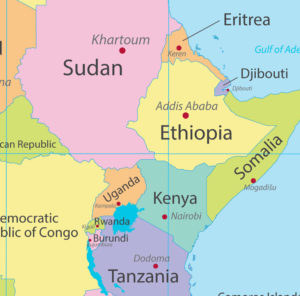
(Bigstockphoto)
Before long, the electoral agency expressed concern that some aspirants were violating the rules. But it wasn’t just about that. The authorities were reportedly also unhappy with how Kyagulanyi was proceeding with his media campaign. To this end, the Uganda Communications Commission reportedly wrote to Google to demand that it ban certain YouTube channels linked to or sympathetic to Kyagulanyi.
In a Dec. 9 letter to Google’s chief executive officer, the Uganda Communications Commission said it had received “complaints from stakeholders” that communication platforms including YouTube were being used to publish content made illegal by the Uganda Communications Act of 2013 and another 2019 regulation.
It charges such communication “misrepresents information, views, facts and events in a manner likely to mislead the public” and “contains extremist or anarchic message likely to incite violence against sections of the public on account of their tribe and political opinions.”
The letter listed 14 YouTube accounts it said were used to “mobilize riots that resulted in loss to several lives and property in Uganda.” It implored Google to “block access” to the platforms and “immediately stop aiding and abetting any further breach of the regulatory and penal laws of Uganda through its communication platform.”
Prior to this, the police arrested and charged Kyagulanyi with violating safety rules at a campaign rally in Luuka district. That soon sparked violence, leading to the arrest, tear gassing and death of some people.
Religious leaders speak out
Concerned about the situation, the Inter-Religious Council of Uganda issued a statement signed by the Council of Presidents on Thursday, Nov. 19, saying it was “deeply concerned” about the violent events that occurred the day before, “where the whole world witnessed brutal arrests of political candidates.”
The statement said it was incumbent upon the council as religious leaders “to express our concern on the current political injustices in the country and to provide guidance especially in such a critical period in the history of our country.” It called on the Electoral Commission and others “to adhere to the human rights principles enshrined in the national objectives” and to follow “our National Constitution as well as God’s word in the Holy Bible and Holy Koran.”
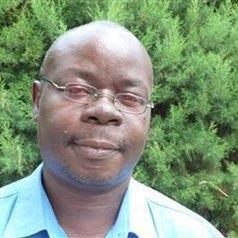
Geoffrey Ssenoga
“The vacillating position of the (Uganda Electoral) Commission coupled with its glaring inability to effectively regulate the directive objectively opened up a can of worms, giving way to individual operational interpretations by different government agencies and departments,” said Geoffrey Bakiraasa Ssenoga, lecturer in journalism, media and communications at Uganda Christian University.
“The police deployed heavily, unleashing tear gas and live ammo purportedly to implement this directive, leaving many dead and injured in its wake,” he said. “The Uganda Communication Commission, which oversees the media, invoked a clause that requires prior authorization to all data communication and broadcasting organizations before providing such services to the public.”
As a result, “many opposition candidates have been denied broadcast media time by government representatives while media organizations have protested against the spirit and timing of this directive at this critical moment of vote canvassing.”
Ssenoga added that, in view of this development, “candidates and their parties have in turn exploited this lacuna to make crowd processions purportedly driving through to scheduled campaign places. The police have responded in force, and media personnel have been harassed in the process; they now wear bullet-proof vests and helmets like in a war zone.”
On the other hand, he said, “The public audience has been terrorized and fatigued by the violence on radio/TV leading to low listener/viewership of legacy media.” That, in turn, has led Ugandans to turn to interactive social media that streamline events as they happen, thus boosting social media platforms like WhatsApp, Instagram, Twitter and Facebook.
Museveni’s long tenure
At 76, Museveni is one of Africa’s unyielding dictators. There are some others, like Paul Biya of Cameroon, who came to power in 1982 and Teodoro Obiang Nguema Mbasogo, president of Equatorial Guinea, who’s been in charge of his country since 1979.

Ruth Atim
Asked to rate Museveni’s performance as leader, Ruth Atim, co-founder of The Gender Initiative-Uganda, explains she has known only one president — Museveni-— in her lifetime.
In contrast to Museveni, Atim says candidate Bobi Wine “is young, and his message of change appeals to the youth as more than 50% of Uganda’s population falls within the youth gap.”
“If a democratic election prevails, then Uganda will have a new president come 2021,” she believes. “Many Ugandans are eager to vote in the January elections but are worried that the elections will be rigged based on the current trend of events where the opposition presidential aspirants are being arrested, teargassed and their supporters shot with live bullets and some dying in the process.”
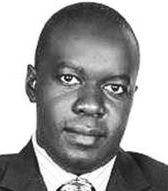
Yasin Kakande
Yasin Kakande, a U.S.-based Ugandan journalist and author, agrees that Bobi Wine is a popular candidate but says that doesn’t guarantee him winning an election in Uganda’s current political climate.
“Uganda’s electoral and security officials have their loyalty to Museveni and not Ugandans,” he said. “Bobi Wine has the support of most Ugandans but not a chance to win the elections. In Uganda, having the people who count the votes is more important than having the voters. The recent deployment of Uganda’s military to police Bobi Wine’s rallies and the shooting of his supporters protesting his arrests are just a reminder of who is in charge.”
In his book Why We Are Coming, Kakande paints a picture of Museveni as a puppet or errand man of the West in Africa, willing to do their bidding. Asked whether that view still prevails, he replied: “The Western media could be starting to question Museveni’s dictatorship but key Western institutions like the Pentagon, IMF and World Bank are still in Museveni’s pockets. Museveni marketed himself to the West as the only leader capable of both halting the rise of Islamic fundamentalism or terrorism and also surrendering the region’s resources to Western corporations. These two tenets are still important to the West regardless of who is in power in Washington.”
While there are plenty of people who question Museveni’s candidacy given his long years in power, Freke Ette, visiting assistant professor of political science at Amherst College, believes running again is within his right.
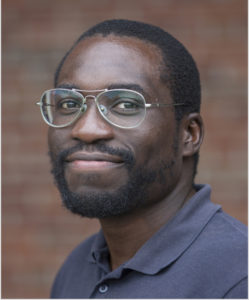
Freke Ette
“I am not really surprised that President Museveni seeks a new term,” he said. “If he believes he remains qualified for the office and capable of fulfilling its responsibilities, then he can run.”
However, “the egotism of lifetime presidents is less shocking than the electorates that return them to power. Leaders like Museveni and Biya rule because their citizens permit them.”
Describing long-serving leaders as “dinosaurs,” Ette said at the end of the day, change still could come to Uganda.
“I don’t believe there is a magic word, which once spoken transforms the socio-economic fortunes of the (African) continent. Citizens must demand change for themselves. Specifically, they must articulate the reforms they desire, tenaciously pursue them and not be dissuaded from their purpose, either through threats, bribery or co-option. Such a turn in fortunes requires a spiritual awakening that rejuvenates moribund constitutions, motivates a new crop of political candidates, emboldening citizens and communities to demand the best from life, rather (than) merely managing it.”
Anthony Akaeze is a Houston-based journalist who began his career in his home of Nigeria. He specializes in reporting on faith from an African perspective.
This article was made possible by gifts to the Mark Wingfield Fund for Interpretive Journalism.

